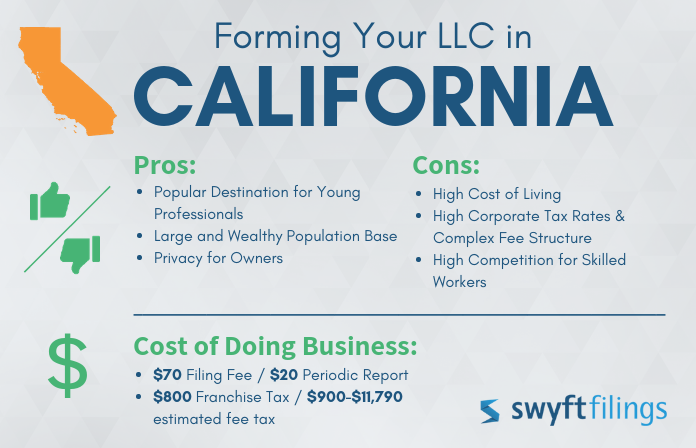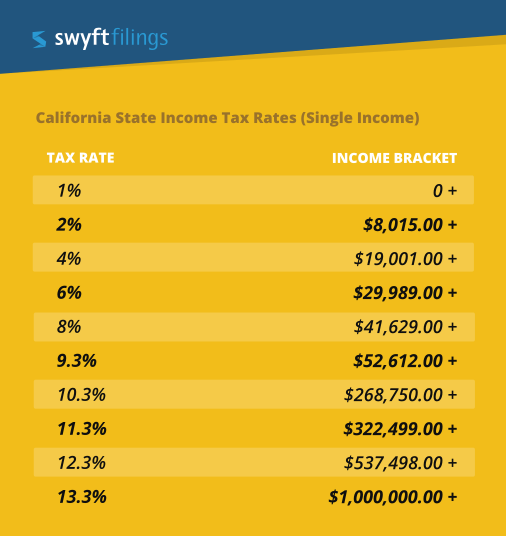State Guides
Guide to Forming an LLC in California

Follow our free guide to form an LLC in California:
- Pros and Cons of Forming an LLC in California
- Starting Your California LLC
- Maintaining Your California LLC
- Additional California Resources
Starting an LLC in California is a process with multiple steps. Our comprehensive guide is divided into two main phases, detailing every part of the California LLC formation journey.
Pros and Cons of Forming an LLC in California

Pros
Popular Destination for Young Professionals
Any publication compiling a list of popular U.S. cities for young professionals will likely include San Francisco and the up-and-coming tech suburb Sunnyvale. Other fast-growing CA destinations for millennials and recent college grads are Berkeley and San Jose.
Large and Wealthy Population Base
California is the most populated state in the U.S. and is home to three of the nation’s largest cities. The state also boasts an impressive median income ($77K) that is roughly $6,000 higher than the national average ($71K).
Privacy for Owners
California does not require the LLC members/manager to be listed in the Articles of Organization. An organizer can submit the official documents to the state in place of the actual owners.).
Cons
High Cost of Living
California topped a recent list of the most expensive U.S. cities, netting five of the ten spots on the list. San Francisco is easily the priciest CA city, with an average two-bedroom apartment costing well over $4,000 a month.
High Corporate Tax Rates and Complex Fee Structure
California actually has two types of tax classifications for businesses— the 8.84% corporate tax for corporations, and the franchise tax for LLCs. The franchise tax is $800 annually in addition to an estimated fee tax with a sliding scale from $900 to $11,790 (depending on annual profits). The corporate tax may go up even more, to an astonishing 18.84% if the current proposal is approved by the state legislature.
High Competition for Skilled Workers
With all that California has to offer, its skilled workforce is surprisingly sparse. According to recent reports, within 12 years, California will be in a skilled employee deficit by over 1 million people without undergraduate degrees. The demand in CA is very high and colleges/universities aren’t keeping up.
Cost of doing business
- $70 filing fee / $20 periodic report
- $800 franchise tax / $900-$11,790 estimated fee tax
Phase One: Starting Your California LLC
If you decide to start an LLC in California, you might be surprised at how simple the process can actually be when you have the right kind of help. The first phase of the process focuses on forming your new business.
- Step 1: Name your LLC
- Step 2: Establish ownership of your LLC
- Step 3: Find a Registered Agent
- Step 4: File the Articles of Organization
- Step 5: Create your Operating Agreement
- Step 6: Obtain an EIN
Step 1: Name Your California LLC
The first major step involved in forming your California LLC is naming your business. Both the state and federal governments have guidelines and restrictions concerning what words can/can not be used for business names.
Tip: Use a free business name search tool to ensure your company’s desired name is available.
Business Name Guidelines
- The official name of your business must end with: Limited Liability Company, Limited Company, LLC, or L.L.C.
- Your business name cannot be intentionally misleading to consumers
- The name of your new LLC must not be similar to another organization’s name/trademark
Restrictions
- “Lottery” and “Bank” are ineligible for use (any state)
- Terms that represent educational or Veterans’ organizations are restricted
- Terms related to the Armed Forces or civil servants (police, EMT, fire)
LLC business names associated with government and/or financial entities are not always restricted - it depends on the state. Additional paperwork may be required.
URL Availability
You will also need to create an online presence for your new LLC by acquiring a domain name for your website. You can easily check domain name availability at a number of online web services sites.
Step 2: Establish Ownership
The owners of LLCs are actually referred to as members and managers. All LLCs will have members, but not every LLC will have managers — the difference depends on the management structure of the business.
LLC Management Structures:
- Member-managed: All members participate in operating and making decisions for the LLC
- Manager-managed: An appointed manager oversees the daily operations of the LLC and the members are not actively involved.
California LLC Member Guidelines
Required Number of Members
There must be at least one member or manager to form an LLC in California.
Member Disclosure Requirements
California LLCs may list an organizer (the party who prepares the documents) on the Articles of Organization in place of the members or manager.
Age Restrictions
LLC members in California may be of any age.
Residence Restrictions
There are no residency restrictions imposed on LLC members in California.
Step 3: Find a Registered Agent in California
The registered agent is a requirement for all California LLCs. Your new business will not be officially formed without filling this position.
What is a registered agent?
A registered agent is a person or business who is authorized to accept official government notices (including the Secretary of State) and service of process notices on behalf of the LLC.
Why do you need a registered agent?
California law requires you to appoint a registered agent so that the state government has a consistent contact person for your LLC.
What are the main requirements for a registered agent?
- The registered agent must have a physical address — not a P.O. Box
- The registered agent must be available during business hours
Who can be a registered agent in California?
- A California resident with a physical address in California
- An LLC/corporation that is licensed to operate in California
Can I be my own registered agent for my business?
You are legally allowed to be your own registered agent as long as you have a physical address in California.
Is being my own registered agent discouraged?
Since the registered agent’s name and address are publicly listed, LLC business owners who choose to be their own registered agent risk compromising their personal information.
Tip: Avoid the hassles and choose Swyft Filings to fill the registered agent needs for small businesses in California. Find more information here.
Step 4: File the Articles of Organization
Filing the Articles of Organization with the Secretary of State is the most vital step in creating your California LLC.
What is the Articles of Organization?
The Articles of Organization is a legally binding document that is filed with the state government to officially and legally form your LLC.
Why do I need the Articles of Organization?
Your LLC business in California will not be legally recognized by the Secretary of State without filing this document. Consider the Articles of Organization as part of your LLC’s foundation.
What information is included in the Articles of Organization?
- The name and address of the LLC
- The name and location of the registered agent
- The statement of purpose
- The name of the organizer filing the paperwork
- The chosen LLC management structure
When you form your LLC with Swyft Filings, we’ll handle filing the Articles of Organization for you.
Additional California filing requirements
Professional service businesses are not allowed to form LLCs in California.
The following professions are considered professional service businesses:
- Accountants
- Attorneys
- Physicians/ Medical Professionals
- Professional Counselors and Psychologists
- Architects and Engineers
- Veterinarians
- Social Workers
Step 5: Create an LLC Operating Agreement
Having an LLC Operating Agreement for your California LLC, while not required by law, is necessary for the successful formation of your new business.
What is an LLC Operating Agreement?
The LLC Operating Agreement is a legally binding document that is used by the business to identify operating procedures through the explanation and definition of the members’ roles, including the responsibilities and voting rights of each party.
Why do I need an LLC Operating Agreement?
The LLC Operating Agreement plainly explains the functions of the LLC’s members and provides direction for daily operations — doing so creates stability and structure for the business and reduces disputes.
Do I need to file the LLC Operating Agreement?
You do not need to file the Operating Agreement with the state — the document remains in-house.
What goes into an LLC Operating Agreement?
Every LLC Operating Agreement is different, but most documents typically include the following information:
- List of the members/managers and their roles
- Designation of authority in the LLC
- Initial capital contributions of the members
- Voting designations and percentages of the members
- Member transfer/addition rules and restrictions
- Distribution of profits
- Meeting schedule
Tip: Get a customized LLC Operating Agreement for your small business with Swyft Filings. Add structure to your LLC now.
Step 7: Obtain an EIN
Most businesses formed in California must register for an EIN. Your California LLC will not be able to conduct business without this ID.
What is an EIN?
The EIN (Employer Identification Number), also called a Federal Tax ID, is a nine-digit number that is issued by the IRS to businesses; the numeric code identifies the business with the federal government.
Are all businesses required to have an EIN?
Federal law dictates that certain types of business entities register for an EIN:
- Any business with employees (even if owned by one person)
- Any business with more than one member
- A partnership (LLC or C-corp)
A sole proprietorship is not required to have an EIN, but it is still recommended.
Why does my LLC business need an EIN?
The more common reasons you would need an EIN are:
- To hire employees
- To open a bank account in the U.S.
- To file your company’s taxes
- To pay independent contractors
In short, if your business has employees and makes money, you will need an EIN.
Is the EIN publicly listed?
The EIN for your LLC will be part of public record.
Can I use my Social Security Number as the EIN?
If you are a sole proprietorship who wants an EIN for your business, you can elect to use your social security number; however, your EIN is part of public record.
Swyft Filings offers EIN services for small businesses in California. Find more information here.
Phase Two: Maintaining Your California LLC
The first phase of your California LLC formation is now complete. The next phase help move your business forward and stay compliant.
- Step 1: Register for California State Taxes
- Step 2: Obtain Permits and Licenses
- Step 3: File a Statement of Information
- Step 4: Order a Certificate of Good Standing
Step 1: Register for California State Taxes
LLC business owners in California are responsible for paying up to three different sets of taxes:
- Minimum Franchise Tax (MFT)
- Estimated Fee for LLCs
- CA State Income Tax
LLC Taxes
The Minimum Franchise Tax (MFT) is $800, regardless of the size of the business, and must be paid annually. Any LLC formed in California must pay this tax. The first MFT payment should be made on/before the 15th day of the 4th month. For example, if an LLC is formed in October, the first tax payment will be due before January 15th.
The Estimated LLC Fee is slightly more complicated — the sliding scale fee schedule ranges from $900 to as much as $11,790 for businesses with more than $5 million in net income. Any LLC under $249,000 is exempt. See chart below:

Please Note: All California LLCs must file an LLC Return of Income, a state-required tax return specifically for the business.
State Income Taxes
California has a tiered income tax rate that can be as high as 13.3%:

Corporate Tax Information
You can also choose to have your LLC taxed as a corporation; if so you will be responsible for paying the corporate income tax rate on your business’s earnings. Corporations in California must pay an 8.94% corporate income tax.
Additional Tax Information
Other taxes your LLC may need to pay:
- Sales Tax at 7.25%
- Employee Withholding Tax
- Unemployment Tax
Step 2: Obtain Business Licenses and Permits
The business licenses and permits required in California vary wildly depending on the county or municipality where your new LLC is located.
Tip: If you would like to see more in-depth information on licenses and permits, please feel free to visit the content in our learning library that covers business licenses and permits.
Step 3: File a Statement of Information
LLCs formed in California are required to file a Statement of Information with the Secretary of State. The first filing must be within 90 days of LLC formation.
What is a Statement of Information?
A Statement of Information, which is also called an annual report, is a legal form that is filed with the Secretary of State on a periodic basis to keep your business’s information current with the state.
What goes into the Statement of Information?
The information requested in the Statement of Information is similar to what was listed in the Articles of Organization:
- The name and address of the business
- The name and address of the registered agent
- The names of the members
- The business’s EIN
Is the Statement of Information part of public record?
The Statement of Information filed on behalf of your LLC is a matter of public record.
Fees and Due Date
Fee: $20
Due Date: within 90 days of forming, then every 2 years
Implications of Late Filings: $50 late fee
Swyft Filings helps you stay compliant by providing stress-free solutions. File your statement of information with us today.
Step 4: Obtain a Certificate of Good Standing
After your California LLC has been formed and is ready for business, there is still one last step — securing a Certificate of Good Standing for your business.
What is a Certificate of Good Standing?
The Certificate of Good Standing is an official notification that confirms your business is properly formed and is in compliance with all state regulations.
Who issues the Certificate of Good Standing?
The Certificate of Good Standing is generally issued by the Secretary of State.
When can I request a Certificate of Good Standing for my business?
You will be able to request a Certificate of Good Standing after your LLC is officially formed through the Secretary of State.
Why do I need a Certificate of Good Standing?
Many businesses and financial institutions want proof that your LLC is in good standing with the state government. Some companies may not even agree to conduct business if your LLC does not have this certification.
Additionally, some states require a Certificate of Good Standing before a business can apply for Foreign Qualification.
Does the Certificate of Good Standing have an expiration date?
The Certificate of Good Standing does not expire/does not need to be renewed.
Swyft Filings can create a Certificate of Good Standing for your California LLC. Click here for more information.
